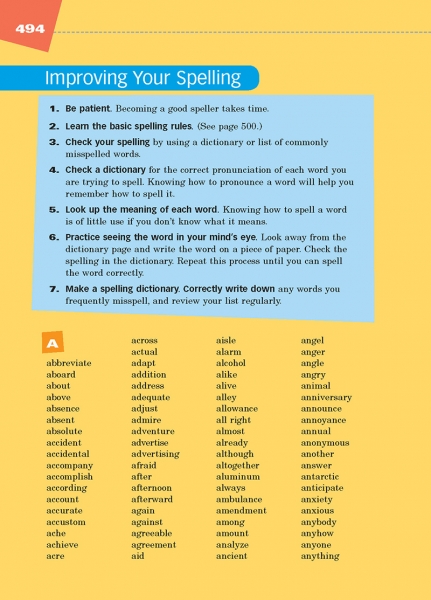Page 494 from

Start-Up Activity
Some students may think spelling is unimportant. People misspell things all the time when they text, and others understand. And word processing programs correct spelling anyway. To help impress on students the importance of spelling, display the opening of Shakespeare's A Midsommer Nights Dreame with his original spelling:
Theseus.
NOw faire Hippolita, our nuptiall houre
Drawes on apace: foure happy daies bring in
Another Moon: but oh, me thinkes, how slow
This old Moon wanes; She lingers my desires
Like to a Step-dame, or a Dowager,
Long withering out a yong mans reuennew.
Hippolita.
Foure daies wil quickly steep thẽselues in nights
Foure nights wil quickly dreame away the time:
And then the Moone, like to a siluer bow,
Now bent in heauen, shal behold the night
Of our solemnities.
Theseus.
Go Philostrate,
Stirre vp the Athenian youth to merriments,
Awake the pert and nimble spirit of mirth,
Turne melancholy forth to Funerals:
The pale companion is not for our pompe,
Hippolita, I woo'd thee with my sword,
And wonne thy loue, doing thee iniuries:
But I will wed thee in another key,
With pompe, with triumph, and with reuelling.
Students might rightly say, "What? . . . nuptiall houre? . . . a yong mans reuennew? . . . wonne thy loue, doing thee iniuries? Couldn't Shakespeare even spell?" No, he couldn't. Nobody could back then. Standard dictionaries hadn't yet been developed, so people spelled however they thought seemed right.
Modern writers have the benefit of dictionaries, spell checkers, and rules of plurals and other mechanics. Without these tools and modern spelling, we would have to sound out everything phonetically:
Djeweechet? Noebuddumgunna. (Did you eat yet? No, but I'm going to.)
Yes, spelling is actually our friend.
Think About It
“Ladies, if you want to know the way to my heart . . . good spelling and good grammar, good punctuation, capitalize only where you are supposed to capitalize; it's done.”
—John Mayer

Start-Up Activity
Some students may think spelling is unimportant. People misspell things all the time when they text, and others understand. And word processing programs correct spelling anyway. To help impress on students the importance of spelling, display the opening of Shakespeare's A Midsommer Nights Dreame with his original spelling:
Theseus.
NOw faire Hippolita, our nuptiall houre
Drawes on apace: foure happy daies bring in
Another Moon: but oh, me thinkes, how slow
This old Moon wanes; She lingers my desires
Like to a Step-dame, or a Dowager,
Long withering out a yong mans reuennew.
Hippolita.
Foure daies wil quickly steep thẽselues in nights
Foure nights wil quickly dreame away the time:
And then the Moone, like to a siluer bow,
Now bent in heauen, shal behold the night
Of our solemnities.
Theseus.
Go Philostrate,
Stirre vp the Athenian youth to merriments,
Awake the pert and nimble spirit of mirth,
Turne melancholy forth to Funerals:
The pale companion is not for our pompe,
Hippolita, I woo'd thee with my sword,
And wonne thy loue, doing thee iniuries:
But I will wed thee in another key,
With pompe, with triumph, and with reuelling.
Students might rightly say, "What? . . . nuptiall houre? . . . a yong mans reuennew? . . . wonne thy loue, doing thee iniuries? Couldn't Shakespeare even spell?" No, he couldn't. Nobody could back then. Standard dictionaries hadn't yet been developed, so people spelled however they thought seemed right.
Modern writers have the benefit of dictionaries, spell checkers, and rules of plurals and other mechanics. Without these tools and modern spelling, we would have to sound out everything phonetically:
Djeweechet? Noebuddumgunna. (Did you eat yet? No, but I'm going to.)
Yes, spelling is actually our friend.
Think About It
“Ladies, if you want to know the way to my heart . . . good spelling and good grammar, good punctuation, capitalize only where you are supposed to capitalize; it's done.”
—John Mayer